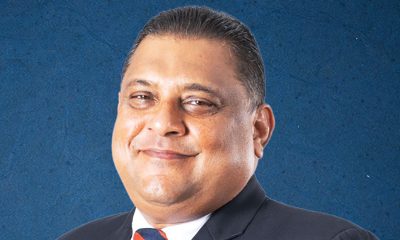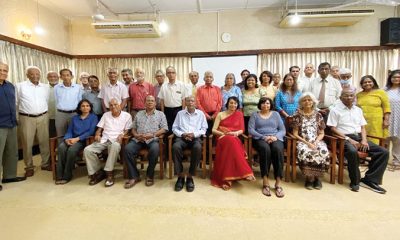Editorial
All bark and no bite

Saturday 25th January, 2025
Inordinate delays in the Customs clearance of imported freight containers have angered importers and container truck operators beyond measure. About 30 ships have already skipped the Colombo Port owing to congestion. There seems to be no end in sight to the protracted delays and the resultant long queues of container trucks in areas like Orgugodawatte.
President Anura Kumara Dissanayake sought to remedy the situation by ordering the Customs to work 24/7, but to no avail. At a meeting chaired by him, the Customs bigwigs agreed to do as he said, but delays persist.
Worse, it has now been revealed that as many as 323 containers have been released without Customs inspection amidst delays. Deputy Minister of Ports and Civil Aviation Janith Ruwan Kodituwakku has reportedly said the government takes full responsibility for the containers so released.
He has said that due to congestion, some containers have to be processed via the green channel as it is not possible to inspect as many as 2,000 40-foot boxes individually on a daily basis. He has also said the aforesaid 323 containers were released under the supervision of a three-member committee.
Smugglers must be making the most of the unchecked release of shipping containers. Contraband goods are often found in containers brought in through the Colombo Port, which has also become a major entry point for narcotics, and therefore the government must reveal to the public who ordered the release of the aforesaid 323 containers without inspection, and what they carried.
One may recall that in 2013, more than 131 kilos of heroin were found in a shipping container, which a coordinating secretary to the then Prime Minister D. M. Jayaratne requested the Customs to clear on a priority basis. In July 2017, a consignment of cocaine weighing 218 kilos was detected in a container carrying sugar, at the Ratmalana Economic Centre. There have been numerous instances where Customs checks yielded huge amounts of dangerous drugs concealed in freight containers. Besides, Sri Lanka shipped back 263 containers filled with hospital waste to the UK; those banned items were imported in 2017 and 2019. This shows why no container should be released through the green channel.
The NPP government keeps on claiming that the current Customs delays have come about due to lapses on the part of the previous administrations, and new container yards will have to be built and the existing ones expanded to streamline the Customs clearance of imported containers.
True, the past governments were not blameless, but the current situation is due to the government’s failure to make the Customs fall in line. So, instead of trying to scapegoat its political rivals, the government must deal with the Customs with a firm hand.
It has chosen to kowtow to a cartel of wealthy rice millers and private bus operators despite its leaders’ braggadocio. The Customs are also defying government orders with impunity to all intents and purposes. Some importers have said that if the government plucks up the courage to confront the Customs, it will be able to streamline the release of containers within 48 hours.
Meanwhile, the irate container truck drivers who have to wait on the road for days on end, without access to sanitary facilities, etc., have threatened a strike. Their grievances are legitimate, and it is hoped that the government will address them.
Editorial
Terror and counter terror:upsetting a rubbish mountain

This comment is being written ahead of the normal Friday deadline for printing the Sunday Island due to the forthcoming New Year holidays – that is before sittings of Parliament commenced on Thursday to debate the Batalanda Commission report. But it has also drawn on some of what was said in the early stages of that debate. This widely anticipated discussion will continue for a second day next month after parliament adjourned for the New Year on Thursday evening.
Batalanda and the torture chamber run there in the wake of the JVP’s second adventure between 1987 and 1989 has received a great deal of publicity, particularly in the electronic media, in recent weeks. As readers are well aware, former President Ranil Wckremesinghe, who began his parliamentary career in 1977 from the Biyagama electorate where Batalanda is located, is specifically targeted.
Earlier this year, Wicremesinghe fared disastrously in Al Jazeera’s Head to Head program, modeled on BBC’s Hard Talk, which famously interrogates interviewees with rapidly fired questions, where a very hard time is given to whoever is interviewed in what are often unequal exchanges. We have in this space previously said that it was clearly apparent during the program, which attracted global publicity, that the former president seemed to have knowingly walked into a trap for reasons that are not easily fathomable. Knowingly because the line of questioning was to be expected and the program host’s strategy of embarrassing the guest would have been obvious. But RW accepted an invitation to appear on a show that put him through a mincing machine. The Sinhala idiom illagena parippu kanawa neatly sums up what eventually happened to our former president.
RW was interviewed in London before a hostile audience dominated by LTTE supporters from the Tamil diaspora. The so-called “expert panel” whose comments were invited during the program was loaded two to one against the former president. Only Mr. Niranjan Deva Additiya, commonly known as Nirj Deva, a former British MP who also sat in the European Parliament could be regarded as not anti-Ranil, having served as a special envoy during the Wickremesinghe presidency. The other two panelists were extremely hostile to Wickremesinghe. Interviewer Mehdi Hasan, gave RW barely a chance to answer his questions fired with machine-gun rapidity, intervening and interrupting most unfairly.
Anybody with an inkling of Sri Lanka’s contemporary history beginning from 1971 when the JVP, which had only a year previously supported the United Front coalition led by Mrs. Sirima Bandaranaike to roundly defeat the Dudley Senanayake-led UNP, would know that Rohana Wijeweera’s ‘new left’ unexpectedly attempted via a youth insurgency to topple a government it had helped elect months earlier. The rebels were mostly armed with home made bombs and commandeered shotguns supplemented with weapons captured from the armories of several police stations they overran.
The then government brutally reacted to crush the rebellion and dead bodies by the roadside and floating down rivers were a common sight at that time. The official death toll was 1,200 including 37 police officers killed and 195 wounded. Wikepedia citing “reliable sources” estimated 4,000 dead. India and Pakistan were among neighboring countries that assisted with men and material to help the beleaguered government at that time. The US sold us six Bell 47G helicopters which were put into combat after minimal pilot training. Britain and the USSR also provided assistance. The North Korean Embassy in Colombo was closed and it’s personnel expelled. China was suspect although there was no evidence whatever to implicate her.
Wijeweera, who had a scholarship to study medicine at Moscow’s Lumumba University had been taking a pro-Chinese line in the USSR and was not permitted to re-enter Russia after he came here on holiday. He flirted briefly with the China wing Communist Party here led by Mr. N. Sanmugathasan (nicknamed Mao Tse-Shan) and sported a tunic suit, beret and a Mao badge at the Criminal Justice Commission that tried him and other JVP leaders following the 1971 insurrection. The JVP’s second adventure between 1987-89 made 1971 pale into insignificance with the country driven to the brink of anarchy with numerous assassinations of politicians, union leaders and sundry others.
Predictably, the opposition and principally the SJB, that was once very much a part of the UNP at that time, while not defending state terror countering JVP terror then credibly made the point that Batalanda was not the only detention center where third degree methods were used during the northern and southern insurgencies. “Why are you merely looking at Batalanda? What about the other places commanded by ex-servicemen who are now part of your government where these things happened? Are you not going to investigate those places too?,” SJB frontbencher Mujibur Rahman asked opening the debate on behalf of the opposition.
He opened his speech describing the whole issue as one of digging up a rubbish mountain several decades after the events. Countering what Deputy Minister Sunil Watagala who quoted a chunk of the commission report, Rahman did likewise with a lengthy quotation from the end of the report saying that in no way could what the JVP and its armed vigilante squads did in that period be countenanced. The commission had reported on its findings of what happened at Batalanda and not, it was implied, on the context in which such extra legal measures were taken.
President JR Jayewardene expressed a truism saying that “in times of war, laws are silent.” As it happened during the 30-year civil war and the JVP’s 1987-89 insurgency, the state responded to terror with counter terror and there was no serious public opinion among ordinary people against what happened. The JVP which was part of governments and with political alignmnts with the rulers at different times had not, as Mujibur Rahuman pointed out, not bothered to even find out who liquidated Rohana Wijeweera. He alleged that somebody who had been accused as being the killer was recently rubbing shoulders with a high up in the government.
Editorial
Justice must be balanced

Saturday 12th April, 2025
President Anura Kumara Dissanayake will appoint a committee to decide on instituting legal action against those named in the report of the Batalanda Commission, which probed extrajudicial killings, torture, etc., in the Batalanda detention centre, in the late 1980s, Leader of the House and Minister Bimal Ratnayake has said. The commission report has also been referred to the Attorney General for action, according to media reports quoting Ratnayake.
Parliament had a debate on the Batalanda Commission report on Thursday. The government MPs and their Opposition counterparts, true to form, traded allegations and abuse liberally, and it is doubtful whether their debate left the public any the wiser.
The Executive President is vested with powers to appoint committees like the aforesaid one, but such presidential action in respect of the Batalanda Commission report will be seen to be tainted with prejudice, for President Dissanayake is the leader of the JVP, which has prejudged those named in the commission report, especially their erstwhile chum, former President Ranil Wickremesinghe, and is calling for punitive action against them.
There is no guarantee that the presidential committee to be appointed will be different from the Parliamentary Select Committee that probed Chief Justice Dr. Shirani Bandaranayake and prepared the grounds for her wrongful impeachment in 2013. After all, the JVP/NPP has rejected out of hand the findings and recommendations of the Alwis committee, which has held two former high-ranking police officers accountable for their serious lapses which, among other things, led to the Easter Sunday carnage. So, matters concerning the Batalanda Commission recommendations should be left to the Attorney General although he is not completely independent of the Executive.
It will not be possible to build a strong case against Wickremesinghe on the basis of the Batalanda Commission report, whose recommendations lack specificity, according to legal experts. However, one cannot but agree with the JVP/NPP that all those who committed savage excesses in the name of counterterror operations to crush the JVP’s second uprising in the late 1980s must be brought to justice. Similarly, the heinous crimes the JVP committed must also be probed, and the perpetrators thereof must be made to face the consequences of their actions.
The Batalanda Commission report itself has revealed the JVP’s crimes. The JVP carried out hundreds of political assassinations, committed a large number of armed robberies including bank heists, destroyed state assets worth billions of rupees, such as Agrarian Service Centres, tea factories, Paddy Marketing Board storage facilities, buses, trains and countless CEB transformers, attacked military camps and police stations and grabbed a large number of firearms, most of which have not been recovered. The JVP unleashed mindless terror purportedly to extricate Sri Lanka from what it described as the tentacles of India, which it likened to an evil, giant octopus. Its reign of terror crippled the economy so much so that the then President Ranasinghe Premadasa offered to negotiate with it unconditionally. Today, the JVP leaders are eating out of the Indian leaders’ hands and entering into undisclosed MoUs with the ‘evil, giant octopus’, as it were.
All those who were involved in JVP terror in the late 1980s must be held accountable for their crimes, as former JVP presidential candidate and General Secretary Nandana Gunathilake has rightly said. Justice must not be lopsided, and both sides that unleashed mindless terror and committed brutal crimes in the name of counterterror, plunging this country into a bloodbath, must be made to face the full force of the law.
Editorial
Trump in a china shop

Friday 11th April, 2025
US President Donald Trump has made another U-turn––a historic one. He has suspended unprecedented tariff hikes he announced the other day; he vowed that he would neither pause nor waive them under any circumstances. The 90-day tariff reprieve he has opted for has gladdened many hearts and made stock markets soar across the word, but a global recession is looming with a fierce tariff war between the US and China intensifying.
Trump has jacked up tariffs on all Chinese goods to a whopping 125%. China has stopped dilly-dallying and increased its tariff on imports from the US to 84%. The White House is reported to have said those who do not retaliate will be rewarded. Trump may have expected the Chinese leaders also to bow and scrape before him, asking for a tariff reduction.
Meanwhile, President Trump will have a hard time repairing relations with the traditional US allies in Europe. He did not mince his words, when he said, while announcing the new US tariffs, the other day, that many Americans thought Europe was a friend but it had actually ripped off the US. He has shown, albeit unwittingly, that Europe cannot trust the US as an ally. Besides, Der Spiegel, a German magazine once revealed that the CIA had been operating a global network of 80 eavesdropping centres, including 19 listening posts in Europe.
The White House has sought to help Trump save face; it has claimed that his flip-flop is part of a strategy to further US economic interests globally. But the truth is otherwise. Trump got cold feet as stock markets tumbled the world over, and protests erupted in the US itself against his new tariff policy. Initially, he, true to form, chose to dig his heels in, and even coined a new word to disparage the critics of his tariffs. On Truth Social, he called them ‘panicans’. He said: “The United States has a chance to do something that should have been done DECADES AGO. Don’t be Weak! Don’t be Stupid! Don’t be a PANICAN. Be Strong, Courageous, and Patient, and GREATNESS will be the result!” He also said, “Be cool! Everything is going to work out well. The USA will be bigger and better than ever before. On Monday, he announced from the White House that “we’re not looking at” a tariff pause …” He also bragged in a Truth Social post announcing the 90-day tariff pause, that “more than 75 Countries” had called US officials seeking to strike new trade deals. But it is clear that he had to bite the bullet and suspend the tariff hikes. The EU has put its retaliatory tariffs on hold, as a result.
The suspension of US tariff hikes has brought immense relief to the developing countries dependent on the US as a major export destination, but prudence demands that they continue with their efforts to formulate strategies to ensure the survival of their fragile economies in the worst-case scenario. They had better consider the tariff reprieve at issue only an interval in hell, as it were, and brace themselves for what is to come after three months.
Trump’s strategy of using tariffs to subdue the world has yielded some unintended benefits, the main being that it has prompted other nations, including traditional American allies, to realise the risk of being overdependent on the US as a trading partner, diversify their trade relations as well as exports, and, most of all, look for an alternative to the US. The on-going efforts to adopt an alternative international reserve currency is bound to gain a turbo boost from Trump’s abortive bid to leverage America’s hold on the global economy to undermine other nations.
The world owes President Trump a big thank you—not for jacking up US tariffs and then suspending them but for having revealed how far the US is ready to go to further its interests at the expense of the other nations, including its allies.
-

 News4 days ago
News4 days agoSuspect injured in police shooting hospitalised
-

 Features5 days ago
Features5 days agoRobbers and Wreckers
-

 Business4 days ago
Business4 days agoSanjiv Hulugalle appointed CEO and General Manager of Cinnamon Life at City of Dreams Sri Lanka
-

 Business5 days ago
Business5 days agoBhathiya Bulumulla – The Man I Knew
-

 Business6 days ago
Business6 days agoNational Anti-Corruption Action Plan launched with focus on economic recovery
-

 Features3 days ago
Features3 days agoLiberation Day tariffs chaos could cause permanent damage to US economy, amid global tensions
-

 Features3 days ago
Features3 days agoMinds and Memories picturing 65 years of Sri Lankan Politics and Society
-

 Opinion6 days ago
Opinion6 days agoSome aspects of China’s development model











